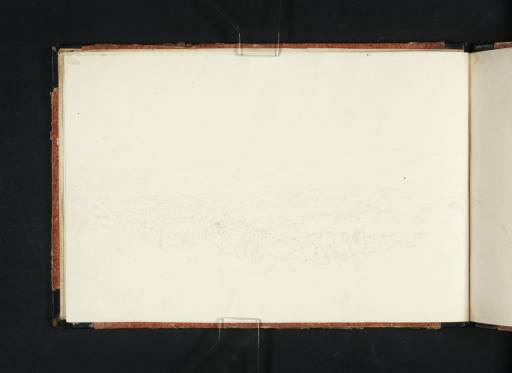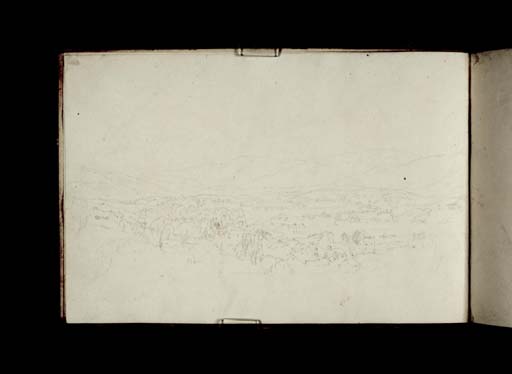Joseph Mallord William Turner Kirkby Lonsdale from the South 1816
Image 1 of 2
Joseph Mallord William Turner,
Kirkby Lonsdale from the South
1816
Joseph Mallord William Turner 1775–1851
Folio 2 Verso:
Kirkby Lonsdale from the South 1816
D11520
Turner Bequest CXLVIII 2a
Turner Bequest CXLVIII 2a
Pencil on white wove paper, 173 x 260 mm
Watermarked ‘[WHAT]MAN | [18]15’
Inscribed by Turner in pencil ‘Cows’
Watermarked ‘[WHAT]MAN | [18]15’
Inscribed by Turner in pencil ‘Cows’
Accepted by the nation as part of the Turner Bequest 1856
References
1909
A.J. Finberg, A Complete Inventory of the Drawings of the Turner Bequest, London 1909, vol.I, p.426, CXLVIII 2a, as ‘A fertile valley, with houses and church and distant hills’.
1984
David Hill, In Turner’s Footsteps: Through the Hills and Dales of Northern England, London 1984, pp.31 as ‘A fertile valley, with houses and church and distant hills. ?Kendal’, 92–4, 127.
Previously unrecognised, this sketch, continued to the right in a few further lines on folio 3 recto (D11525; Turner Bequest CXLVIII 4b, now bound opposite) is identified here as a view of Kirkby Lonsdale from the higher ground of Low Biggins, looking north up the Lune Valley, with St Mary’s Church in the middle distance left, Middleton Fell to the right, and the Howgill Fells in the centre distance. The distant view is similar to that from Kirkby Lonsdale churchyard on folio 4 verso (Tate D11528; Turner Bequest CXLVIII 5a), although that looks further right. It is noteworthy, however, that here the sketch synthesises a rather narrow range of the available mountains upon a somewhat wider view of the town. In the right foreground is what appears to be another church tower. In fact this can be identified as ‘The Gazebo’ built about 17791 in the form of a battlemented tower as a picturesque summerhouse high enough to enjoy a fine view of the Lune Valley. It stood on the south side of Jingling Lane, but had disappeared by 1930.2 The present writer has dated Turner’s sketches of Kirkby Lonsdale to Friday 9 August and Saturday 10 August 1816.
David Hill
May 2009
William Pearson and William White, History Directory and Gazetteer of Westmorland, 1829 (under ‘Lunefield’) say that it was ‘built about 50 years ago’.
Alexander Pearson, Kirkby Lonsdale and Lunesdale in Bygone Days, 1930 (reprinted in Pearson, Kyle, Phillips and Gresson, The Annals of Kirkby Lonsdale and Lunesdale Today, 1996, pp.72–3) gives a picturesque account of the building’s origins, involving several strong men and a tall ladder, and also provides an illustration of the appearance.
How to cite
David Hill, ‘Kirkby Lonsdale from the South 1816 by Joseph Mallord William Turner’, catalogue entry, May 2009, in David Blayney Brown (ed.), J.M.W. Turner: Sketchbooks, Drawings and Watercolours, Tate Research Publication, December 2013, https://www


